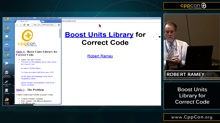Vcpkg: a tool to acquire and build C++ open source libraries on Windows--Eric Mittelette
The Visual Studio Team has announced the availability of Vcpkg, a tool which simplifies acquiring and building open source libraries on Windows.
Vcpkg: a tool to acquire and build C++ open source libraries on Windows
From the article:
Acquiring native libraries on Windows is a critical part of the application development process; in our surveys, you told us that 80% of your C++ projects depend on two or more libraries...

 Have you registered for CppCon 2016 in September? Don’t delay –
Have you registered for CppCon 2016 in September? Don’t delay –  Have you registered for CppCon 2016 in September? Don’t delay –
Have you registered for CppCon 2016 in September? Don’t delay –